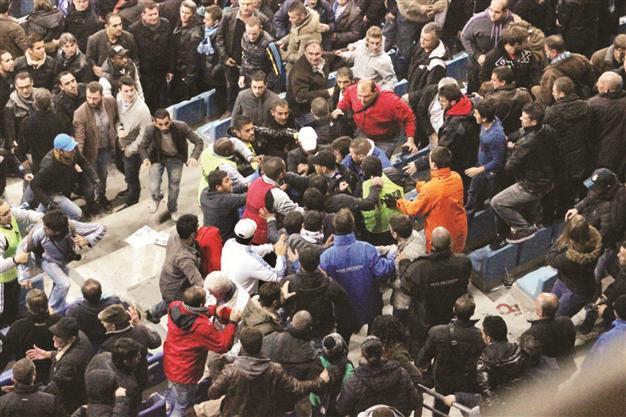Politically-fulled violence mars European football
ISTANBUL - Hürriyet Daily News

DHA photo
The beautiful game was dealt another black eye in Europe this week, as off-the-pitch violence and incidents dripping with racist symbolism overshadowed the play itself in a few stadia.
Though Fenerbahçe celebrated advancing to the next round of the Europa League, their fans fought with Marseille supporters after the latter baited them with PKK and Greek flags at the Stade Velodrome. Elsewhere, Lazio ultras attacked 10 fans of Tottenham – a club seen to have Jewish roots – shouting “Jews, Jews” ahead of their tie in Rome.
Football across Europe has been marred by violence once again, with politics seemingly exacting a toll on the game and the fans that is heavier than ever.
Two games in the Europa League were overshadowed by off-the-pitch incidents on Nov. 22, with fans of Marseille and Fenerbahçe clashing over a flag feud while Lazio fans severely injured Tottenham Hotspur fans prior to their game in Rome in an attack with racial undertones.
Purely political motivations might not have fueled the fights, but in both cases, political issues took center stage.
At the Velodrome Stadium in Marseille, the first encounter between the two groups happened after Fenerbahçe took the lead with a goal from Bekir İrtegün in the game’s 40th minute. Host Marseille’s fans then attacked Fenerbahçe fans, with police intervening to keep the crowd from stampeding.
However, later in the game, Marseille fans unveiled a flag of the Kurdistan Workers’ Party (PKK), much to the anger of the visiting Turks. Fenerbahçe fans started chanting slogans condemning the PKK and attacked the group bearing the flag, leading the police to intervene for a second time.
Another minor fight broke when French fans unveiled a Greek flag to make the Turks angry.
‘Free Palestine’ That was not the only political gesture made in the stands. A group of Fenerbahçe fans unveiled a banner that reads “Murderer Israel, Free Palestine.”
The Israel-Palestine conflict was present at the Lazio-Tottenham Hotspur meeting as well. Lazio fans unveiled a “Free Palestine” banner during the game. It might have seemed odd, given the Lazio fan base’s infamously right-wing political stance, but the gesture made sense considering an earlier attack on Spurs’ fans and amid chants of “Juden Tottenham” (“Tottenham Jews” in German) at the visiting Spurs fans, whose club has a historical Jewish connection; as such, the banner could be seen as anti-Semitic rather than pro-Palestinian.
On Nov. 22, 10 Spurs fans, nine English and one American, were injured in an attack in a Rome pub staged by die-hard Lazio ultras.
Witnesses told local media that masked men armed with knives and baseball bats shouted “Jews, Jews” as they laid siege to a pub where the Tottenham fans were drinking in an old quarter.
In the past three decades, clashes between the Italian and English fans have always been troublesome, but the attack in the Drunken Ship Pub, conducted by up to 100 Lazio Ultras, was more than that. Given that two people among the 15 Italians detained were fans of AS Roma, Lazio’s bitter rivals, the hostility goes beyond any simple sporting matter.
‘Anti-Semitistic trend’Israeli Ambassador to Italy Naor Gilon told reporters that the attack on the Spurs fans, many of whom are Jewish, stemmed from “a new trend of anti-Semitism in Europe.”
Use of politics in football is nothing new. In previous years, it was almost a common practice by Celta Vigo fans to unveil PKK flags during matches against local rivals Deportivo La Coruna, who are known as “El Turco” in Spain. In the end, Vigo fans were merely attempting to throw off their Deportivo rivals by unveiling the flag of the real “Turcos’” enemies.
Turkish football fans are not immune to mixing political issues in stadiums as well. A few years ago, Sivasspor’s Israeli forward, Pini Balili, was subjected to racist abuse due to his country of origin, prompting his coach, Bülent Uygun, to attempt to play down the reaction by showing that the player “was like a Turk.”
When Israeli Haim Revivo played for Fenerbahçe there were also such protests. After his move to rival Galatasaray, there were similar slogans, only coming from the other side.
Football fans use ongoing political issues and racist stances mostly as a weapon to put off the opposition. But that motivation does not hide the fact that what is reproduced via football actually represents a potent threat in society as well.
